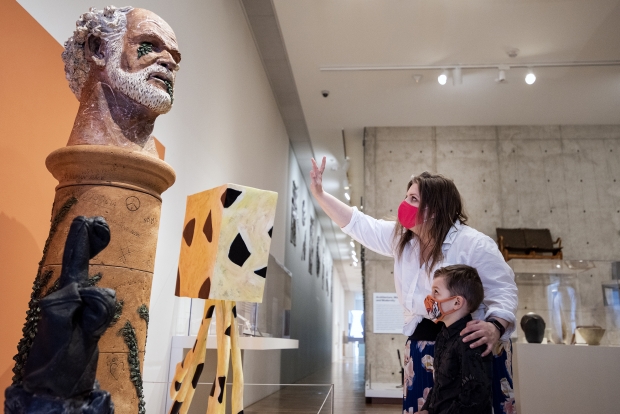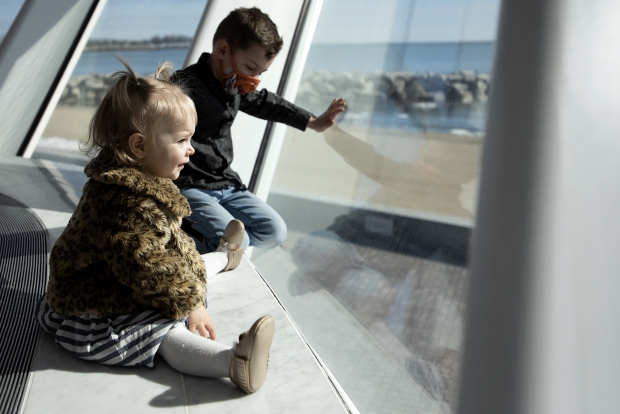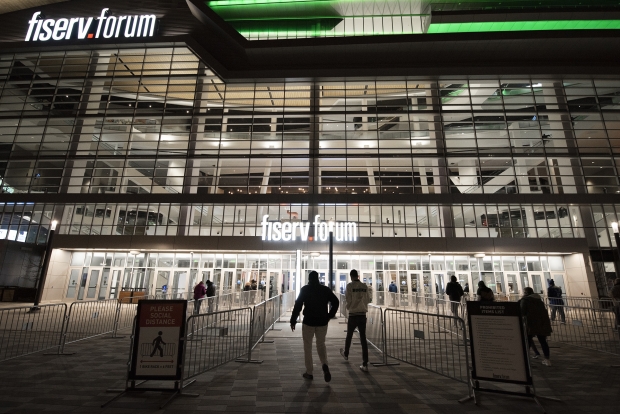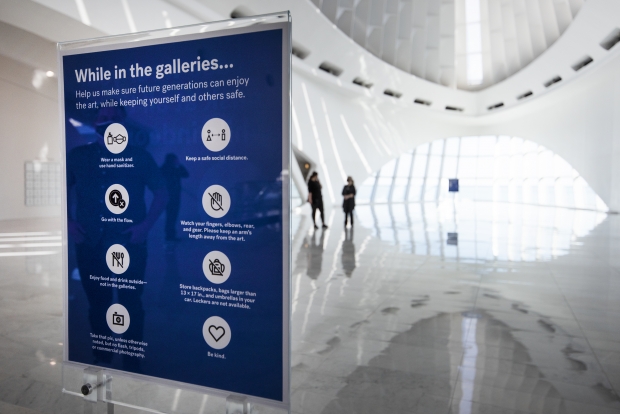As Vaccinations Rise, Normal Life Slowly Returns
Cases continue to drop and museums, sporting events and small concerts are beginning to return.

Ashley Stangel and her 5-year-old son, Sullivan, look at art Friday, March 5, 2021, at the Milwaukee Art Museum. Angela Major/WPR
For the last year, Ashley Stangel has been fighting two wars: one to get people healthy; and another to make people believe the pandemic is real.
But Stangel, a COVID-19 intensive care unit nurse who lives in Pewaukee, is beginning to feel hopeful.
It was a day Stangel felt a tinge of normalcy.
Cornavirus cases across the state are declining, and Stangle says she sees a light at the end of the year-long tunnel.
“We’ve been very, very cautious and the kids haven’t been able to do many things,” she said. “But now, one of our favorite places has reopened, so we decided to put our fancy clothes on and celebrate.”

Sullivan, 5, and Violet, 1, look through the glass at the Milwaukee Art Museum to see pedestrians and Lake Michigan on Friday, March 5, 2021, while visiting the museum with their mother, Ashley Stangel of Pewaukee, Wis. Angela Major/WPR
Milwaukee’s museums reopened the first week in March. The Milwaukee Bucks are allowing a limited number of fans to attend games, and people will be in the stands for the Brewers’ Opening Day on April 1.
The Milwaukee Ballet and Milwaukee Repertory Theater will also have live shows in front of smaller crowds.
Like Milwaukee’s restaurants and bars, entertainment venues have to comply with the city’s coronavirus safety order. Venue capacity can’t be more than 25 percent, although most groups have said they’ll keep attendance to less than that.

Basketball fans walk into the Fiserv Forum to watch the Milwaukee Bucks play the Denver Nuggets on Tuesday, March 2, 2021, in Milwaukee, Wis. Angela Major/WPR
On March 4, the first day the Milwaukee Public Museum was open, Ty and Jenni Tretsven were there with their four children, ages 6, 8, 10 and 12.
While they were checking out the dinosaur exhibits, Jenni said the family needed to get out of their house in northwestern Wisconsin, where the children were being homeschooled because of the pandemic.
“When we made the plans the numbers were going down, and we just thought it would be something to do,” Jenni said. “I guess like a spring break.”
The kids agreed they needed a change of scenery. Behind their masks, you could see their excited grins as the Tretsven children made their way through the museum. They were hoping to visit the Milwaukee County War Memorial Center while in town, but it’s still closed, so they decided to visit the city’s downtown river walk.
“We’re like two seconds away from like murdering each other,” the children yelled, all talking over one another.
A Feeling Of Optimism
Even though the country is still in a pandemic, people are going to start doing more things, said Vivian Marinelli, a clinical psychologist at FEI Behavioral Health in Glendale.
“Human beings don’t have the capacity to stay in that holding period for so long, like we have been,” Marinelli said.
Marinelli said throughout the pandemic, restrictions haven’t been uniform from county to county. Milwaukee has had stricter COVID-19 restrictions than much of the state over the last year, and people are ready to go back to their normal activities.
“People are really looking forward to getting back outside, getting back to some of those activities, and as we see that the numbers are going down and the numbers of vaccines are going up, I think people are more optimistic,” Marinelli said.

A sign instructs Milwaukee Art Museum guests on safety protocols Friday, March 5, 2021. The museum re-opened for the first time in months after being shut down due to COVID-19. Angela Major/WPR
That optimism extends to some of the leaders of Milwaukee’s cultural institutions that have been hobbled by the pandemic.
Michael Pink is the artistic director of the Milwaukee Ballet which normally drew more than 1,500 people to its performances pre-pandemic. The ballet will now be open to 50 guests per show.
“Everyone is feeling the pain of not being able to, as we call it, putting buns in seats,” Pink said. “But to be able to perform for 50 people in our in-house theater is just exhilarating. We know that next will be more, and it will just keep growing.”
Pink and others are counting on them to want to get back to experiencing entertainment and culture in person.
Back at the Milwaukee Art Museum, Stangle says she’s more than ready to do things in person.
“This last year has been tough,” Stangel said. “But there is hope. There is a vaccine, and it feels like the sun is starting to shine a little bit again on us.”
Listen to the WPR report here.
COVID-19 Vaccinations Are Rising, Cases Are Falling, And Milwaukee Is Reopening was originally published by Wisconsin Public Radio.





















